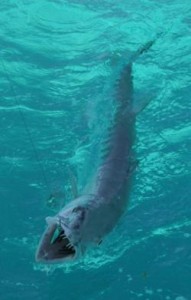Florida Barracuda one step closer to better management
Today’s feature comes to us courtesy the Snook & Gamefish Foundation—read more about this conservation group at www.snookfoundation.org.
By Mike Hodgefrom The Fishing Wire
The barracuda is considered among the fiercest predators on the flats, yet the feisty fish has had little protection when it comes to bag limits in the state of Florida. That may change thanks to the Snook & Gamefish Foundation and other conservation organizations.
The Florida Fish and Wildlife Conservation Commission (FWC) took a big step last week toward establishing regulations to protect barracuda when it announced a proposal restricting recreational and commercial harvests of the fish.
During a public hearing in Sarasota, the FWC staff presented a draft rule to the commissioners, who will formally vote on the measure this fall.
The rule will create:
· a recreational and commercial slot limit of 15 to 36 inches
· a recreational daily bag limit of two fish per person
· a commercial vessel limit of 20 fish
SGF members and staff applauded the recent developments.
“These proposed regulations by the FWC show a deep commitment to protecting and ensuring the sustainability of a species that many people simply overlook, or call a ‘trash fish,’ ” said Mike Readling, chairman of the SGF’s Board of Directors. “As we know, every species is critical to the fine balance of our marine ecosystems, including the toothy ones with poor reputations. These new limits will go a long way toward curbing massive, unnecessary harvests of barracuda, and the Snook and Gamefish Foundation is proud and excited that our iAngler app was singled out by the FWC as one of the avenues to a scientific-based solution for the documentation of this species.”
The FWC, which has not done a formal stock assessment for barracuda, has encouraged fishermen to use the SGF’s Angler Action Program (AAP), an electronic logbook, to help monitor the population.
Photo: dan Decibel”Florida anglers are really lucky to have this commission and science staff,” said SGF Executive Director Brett Fitzgerald, who is particularly satisfied with Florida’s continued willingness to stretch the boundaries of conventional fishery management. “FWC has allowed FWRI to be very progressive, and they are willing to look into new solutions to old fishing problems. In this case, using recreational angler data from the AAP represents a huge shift in the culture of fishery science. Anglers truly are plugged in — directly — to the system. Now every fishing trip that is logged counts towards a brighter fishing future.
“What’s cool is, we didn’t set the system up to help specifically with ‘cudas. But here we are, contributing meaningful info for the protection of that species. And you can bet many more species will follow. The power to improve fishing is truly in our own hands. It’s an opportunity that is unprecedented and well earned by the anglers who have been faithfully logging in the AAP.
“We at SGF can’t say enough good things about the FWRI staff, from top to bottom. Their guidance throughout the AAP development process has been continuous and critical. It’s really an honor to share ideas with them and see the ideas come to fruition.”
Anglers in South Florida, the Keys in particular, have complained that barracuda numbers have declined in recent years, which prodded the Lower Keys Guides Association (LKGA) to launch the Save the Barracuda Campaign.It took nearly two years, but the LKGA concerns have been addressed.
“Barracuda are amazing sport fish, and intricate part to the nearshore flats fishery of the lower Keys and Key West,” LKGA President Luke Kelly said. “When winter weather proves tough for other gamefish, barracuda fill the gaps providing great action on the shallows for the many travelers who find themselves south during winter. We at the LKGA are very happy to see the action taken by the FWC on this important issue.”
No one knows for sure why the South Florida barracuda population has appeared to be dwindling, but commercial harvests could be part of the issue. According to the FWC, commercial harvest of Keys barracuda has increased dramatically the past few years, from 10,000 pounds in 2011 to 50,000 in 2013.
Barracuda is considered an unregulated species commercially, meaning commercial fishermen can harvest as much as they want. Recreational anglers are limited two Cuda or 100 pounds, whichever is greater.
New regulations, if approved, should help, but Fitzgerald warned against complacency.
“We aren’t done yet,” he said. “This is a case where there is power in numbers. We anglers need to continue logging, continue recruiting new anglers into the Angler Action Program’s system. If we were to let this privilege slip by because we decided not to log, we’d really be doing ourselves a disservice.”
The final hearing on barracuda regulations will be held at the FWC Commission meeting in Weston (Sept. 2-3).
*photo credit: Image with ‘cuda and fly reel courtesy of Dan Decibel.

